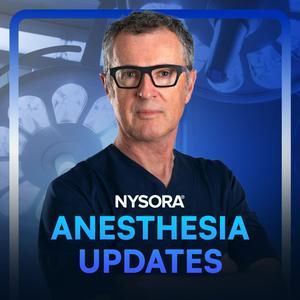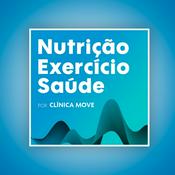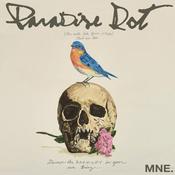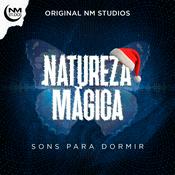72 episódios
- Opioid-free anesthesia sounds appealing, but does it actually improve outcomes? In this episode, we discuss the main findings from a clinical focus review in Anesthesiology by Shanthanna et al. and discuss why avoiding opioids altogether may add complexity without clear benefit. The real win isn’t “opioid-free,” it’s opioid-sparing, procedure-specific, and regional-first anesthesia. Evidence over ideology.
Where else to find us:
Web- http://www.nysora.com
Instagram- instagram.com/nysora.inc/
LinkedIN- linkedin.com/company/nysora-inc/
Facebook- facebook.com/nysora
Twitter- x.com/nysora
TikTok- tiktok.com/@nysora_inc
---------------------------------------------------------
#nysora #regionalanesthesia #anesthesia
Disclaimer: Medicine is an ever-changing science. As new research and clinical experience broaden, changes in treatment and drug therapy are required. The authors and publishers have checked with sources believed to be reliable in efforts to provide accurate information within the available or accepted standards of care. However, given the possibility of human error or changes in medical practice, neither the authors nor the publisher, nor any other party involved in the preparation of this platform warrants that the information contained herein is in every aspect accurate or complete, and they disclaim all responsibility for any errors or omissions for the results obtained from the use of the information contained in this work. Readers are advised to confirm the information contained herein with other sources. For example, readers are advised to check the product information of each drug mentioned, and that any information contained on NYSORA's Podcast is accurate. - Chronic widespread pain isn’t just a quality-of-life issue; it may be an early warning sign for cognitive decline. In this episode, we discuss the main findings from new longitudinal evidence linking widespread pain to mild cognitive impairment, dementia risk, brain structural changes, and inflammation, and what this means for clinicians today.
Where else to find us:
Web- http://www.nysora.com
Instagram- instagram.com/nysora.inc/
LinkedIN- linkedin.com/company/nysora-inc/
Facebook- facebook.com/nysora
Twitter- x.com/nysora
TikTok- tiktok.com/@nysora_inc
---------------------------------------------------------
#nysora #regionalanesthesia #anesthesia
Disclaimer: Medicine is an ever-changing science. As new research and clinical experience broaden, changes in treatment and drug therapy are required. The authors and publishers have checked with sources believed to be reliable in efforts to provide accurate information within the available or accepted standards of care. However, given the possibility of human error or changes in medical practice, neither the authors nor the publisher, nor any other party involved in the preparation of this platform warrants that the information contained herein is in every aspect accurate or complete, and they disclaim all responsibility for any errors or omissions for the results obtained from the use of the information contained in this work. Readers are advised to confirm the information contained herein with other sources. For example, readers are advised to check the product information of each drug mentioned, and that any information contained on NYSORA's Podcast is accurate. - In this episode of NYSORA Updates in Anesthesiology, Dr. Hadzic reveals why the stellate ganglion block (SGB) has re-emerged as a hot topic in perioperative medicine. Drawing on a landmark 2025 narrative review from MD Anderson published in the British Journal of Anaesthesia, we explore what SGB can—and cannot—realistically offer today. From arrhythmia control and postoperative recovery to immune modulation and risk considerations, this episode delivers a balanced, evidence-based perspective to help anesthesiologists decide when SGB truly belongs in modern practice.
Where else to find us:
Web- http://www.nysora.com
Instagram- instagram.com/nysora.inc/
LinkedIN- linkedin.com/company/nysora-inc/
Facebook- facebook.com/nysora
Twitter- x.com/nysora
TikTok- tiktok.com/@nysora_inc
---------------------------------------------------------
#nysora #regionalanesthesia #anesthesia
Disclaimer: Medicine is an ever-changing science. As new research and clinical experience broaden, changes in treatment and drug therapy are required. The authors and publishers have checked with sources believed to be reliable in efforts to provide accurate information within the available or accepted standards of care. However, given the possibility of human error or changes in medical practice, neither the authors nor the publisher, nor any other party involved in the preparation of this platform warrants that the information contained herein is in every aspect accurate or complete, and they disclaim all responsibility for any errors or omissions for the results obtained from the use of the information contained in this work. Readers are advised to confirm the information contained herein with other sources. For example, readers are advised to check the product information of each drug mentioned, and that any information contained on NYSORA's Podcast is accurate. - In this episode, we review the 2026 American Society of Anesthesiologists Practice Guideline on perioperative pain management using local and regional analgesia, based on evidence from more than 600 randomized trials. The guideline delivers a clear message: fascial plane blocks are a core component of modern multimodal analgesia, not an optional add-on. We discuss where the evidence is strongest, including open and minimally invasive abdominal surgery, mastectomy, cardiothoracic procedures, and pediatric surgery, and how these techniques consistently reduce opioid use, improve pain control, and enhance quality of recovery.
Where else to find us:
Web- http://www.nysora.com
Instagram- instagram.com/nysora.inc/
LinkedIN- linkedin.com/company/nysora-inc/
Facebook- facebook.com/nysora
Twitter- x.com/nysora
TikTok- tiktok.com/@nysora_inc
---------------------------------------------------------
#nysora #regionalanesthesia #anesthesia
Disclaimer: Medicine is an ever-changing science. As new research and clinical experience broaden, changes in treatment and drug therapy are required. The authors and publishers have checked with sources believed to be reliable in efforts to provide accurate information within the available or accepted standards of care. However, given the possibility of human error or changes in medical practice, neither the authors nor the publisher, nor any other party involved in the preparation of this platform warrants that the information contained herein is in every aspect accurate or complete, and they disclaim all responsibility for any errors or omissions for the results obtained from the use of the information contained in this work. Readers are advised to confirm the information contained herein with other sources. For example, readers are advised to check the product information of each drug mentioned, and that any information contained on NYSORA's Podcast is accurate. - In this episode, we’re discussing a 2025 randomized controlled trial by Turunc and colleagues published in Regional Anesthesia & Pain Medicine. The study asks a practical, ERAS-focused question: Does adding a bilateral anterior subcostal quadratus lumborum block actually improve analgesia in laparoscopic colorectal surgery? And more importantly, does it meaningfully reduce opioids?
Where else to find us:
Web- http://www.nysora.com
Instagram- instagram.com/nysora.inc/
LinkedIN- linkedin.com/company/nysora-inc/
Facebook- facebook.com/nysora
Twitter- x.com/nysora
TikTok- tiktok.com/@nysora_inc
---------------------------------------------------------
#nysora #regionalanesthesia #anesthesia
Disclaimer: Medicine is an ever-changing science. As new research and clinical experience broaden, changes in treatment and drug therapy are required. The authors and publishers have checked with sources believed to be reliable in efforts to provide accurate information within the available or accepted standards of care. However, given the possibility of human error or changes in medical practice, neither the authors nor the publisher, nor any other party involved in the preparation of this platform warrants that the information contained herein is in every aspect accurate or complete, and they disclaim all responsibility for any errors or omissions for the results obtained from the use of the information contained in this work. Readers are advised to confirm the information contained herein with other sources. For example, readers are advised to check the product information of each drug mentioned, and that any information contained on NYSORA's Podcast is accurate.
Mais podcasts de Saúde e fitness
Podcasts em tendência em Saúde e fitness
Sobre Anesthesia Updates
Anesthesia Updates by NYSORA is your go-to podcast for staying at the forefront of anesthesiology. Hosted by Dr. Hadzic and the NYSORA educational team, each 10-15 minute episode reviews the latest developments, publications, and clinical trends, so you can stay ahead without wading through lengthy research articles. Whether it's the newest guidelines, emerging practices, or essential updates, this podcast delivers highly relevant information that will keep your practice on the cutting edge—one episode at a time.
Site de podcastOuça Anesthesia Updates, On Purpose with Jay Shetty e muitos outros podcasts de todo o mundo com o aplicativo o radio.net

Obtenha o aplicativo gratuito radio.net
- Guardar rádios e podcasts favoritos
- Transmissão via Wi-Fi ou Bluetooth
- Carplay & Android Audo compatìvel
- E ainda mais funções
Obtenha o aplicativo gratuito radio.net
- Guardar rádios e podcasts favoritos
- Transmissão via Wi-Fi ou Bluetooth
- Carplay & Android Audo compatìvel
- E ainda mais funções


Anesthesia Updates
Leia o código,
baixe o aplicativo,
ouça.
baixe o aplicativo,
ouça.








































